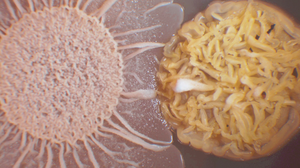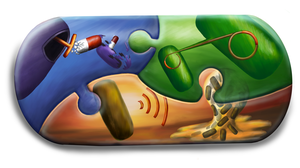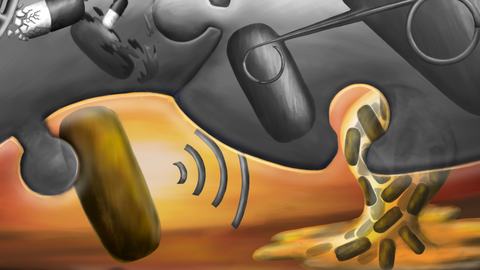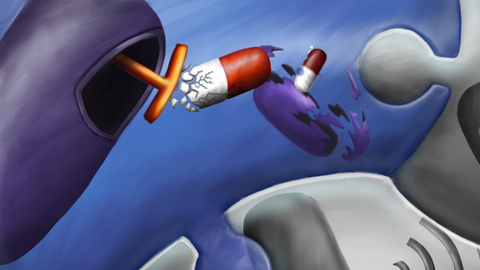Research Areas
Antibiotics are stage center for the three groups of the Chair of General Microbiology. We cover a broad range of research topics: From antibiotic production, via development and spread of antibiotic resistance, to their role as signaling molecules in the context of stress responses and multicellular differentiation. Beyond basic research, we also develop molecular tools for antibiotic research and in the context of Synthetic Biology applications.
 © TM
© TM
Research Focus
At the General Microbiology, everything revolves around interactions. The scientific interactions between research group members are accompanied by social interactions within the research group to keep the spirit high.
Research-wise, we all share a passion for not-so-social interactions between Gram-positive bacteria: We investigate antibiotics as signals and weapons.
How do bacteria perceive antibiotics in the environment?
How do they become resistant when challenged with antibiotics?
How do antimicrobial compounds mediate and interfere with differentiation processes?
Along the lines of the latter, we became increasingly thrilled about studying bacteria as multicellular organisms.
After all, the process of microbial tissue formation is very much coordinated by intercellular interactions, from sharing public goods to sacrificing subpopulations through programmed cell death.
You see, It is (almost) always about interactions with us… Are you interested?
Link to Publications
Review articles on current topics
- T. Mascher, T. Wecke (2011) Antibiotic research in the age of omics: from expression profiles to interspecies communication, Journal of Antimicrobial Chemotherapy, Volume 66, Issue 12, December 2011, Pages 2689–2704.
- T. Mascher, D. Wolf (2016) The applied side of antimicrobial peptide-inducible promoters from Firmicutes bacteria: expression systems and whole-cell biosensor, Appl Microbiol Biotechnol 100, 4817–4829 (2016)
- P. Poop, T. Mascher (2019) Coordinated Cell Death in Isogenic Bacterial Populations: Sacrificing Some for the Benefit of Many?, Journal of Molecular Biology, vol 431, Issue 23, pages 4656-4669.
Review articles on previous topics
- T. Mascher, (2023). Past, Present, and Future of Extracytoplasmic Function σ Factors: Distribution and Regulatory Diversity of the Third Pillar of Bacterial Signal TransductionAnnual Reviews of Microbiology, vol 77.
- J. Radeck, G. Fritz, T. Mascher, (2017) The cell envelope stress response of Bacillus subtilis: from static signalling devices to dynamic regulatory network. Curr Genet 63, 79–90.
- D. Pinto, T. Mascher, (2016) (Actino)Bacterial “intelligence”: using comparative genomics to unravel the information processing capacities of microbes. Curr Genet 62, 487–498.
- T. Mascher (2014) Bacterial (intramembrane-sensing) histidine kinases: signal transfer rather than stimulus perception Trends in Microbiology vol 22, Issue 10, 559-565.
- T. Mascher (2013) Signaling diversity and evolution of extracytoplasmic function (ECF) σ factors Current Opinion in Microbiology, vol 16, Issue 2, 148-155.
- S. Jordan, M. Hutchings, T. Mascher (2008) Cell envelope stress response in Gram-positive bacteria, FEMS Microbiology Reviews, vol 32, Issue 1, 107–146.
- T. Mascher (2006) Intramembrane-sensing histidine kinases: a new family of cell envelope stress sensors in Firmicutes bacteria, FEMS Microbiology Letters, vol 264, Issue 2, 133–144.
- T. Mascher, J. Helmann, G. Unden (2006) Stimulus Perception in Bacterial Signal-Transducing Histidine Kinases Microbiology and Molecular Biology Reviews vol 70 Issue 4, 910-938.
Link to Publications




